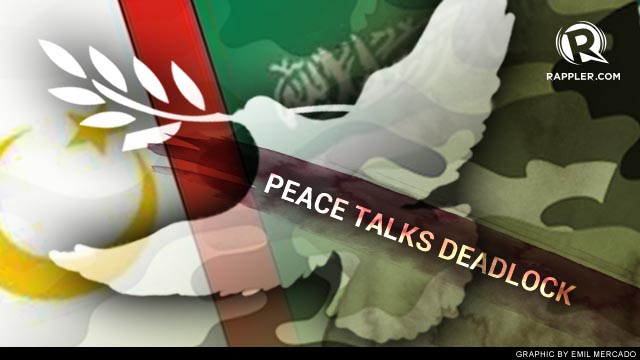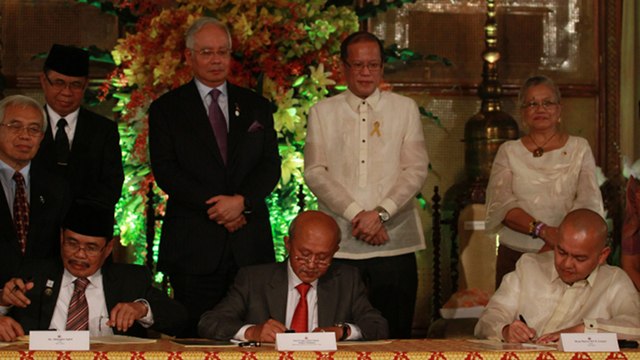SUMMARY
This is AI generated summarization, which may have errors. For context, always refer to the full article.
 MANILA, Philippines – Eight months after the signing of the Framework Agreement (FAB) that raised hopes for peace in Mindanao, the talks between the government and the Moro Islamic Liberation Front (MILF) have reached a deadlock.
MANILA, Philippines – Eight months after the signing of the Framework Agreement (FAB) that raised hopes for peace in Mindanao, the talks between the government and the Moro Islamic Liberation Front (MILF) have reached a deadlock.
Both parties could not agree on how the national government and the envisioned Bangsamoro region would share wealth and power.
The MILF is not happy about the delay. After all, the Transition Commission, which is tasked to draft the Bangsamoro Basic Law that will be the basis of the Bangsamoro region, needs up to two years to finish its work, based on the MILF’s own estimates.
By that time, lawmakers will only have one year to pass the law in the 16th Congress before President Benigno Aquino III steps down from office in June 2016. Once the law is approved by Congress, the Bangsamoro people will approve or reject it through a plebiscite.
Although the Transition Commission has already conducted 3 meetings, it cannot start drafting without the final peace pact.
“We are really pressed for time,” said Mohagher Iqbal, the rebels’ chief peace negotiator. He told Rappler on Sunday, June 16, that the MILF leaders are not satisfied with the current exchange of notes happening between both sides, which he described as “negotiation by correspondence.”
Iqbal said the latest set of notes submitted by the government through Malaysian facilitator Dato Tengku Ab’ Ghafar Bin Tengku Mohamed “diluted” the contents of the initial wealth-sharing annex drafted by the two parties 4 months ago—in February.
“The leadership is angry, not only frustrated but angry,” he told Rappler in a phone interview. Both parties had planned to sign a final agreement before the May elections.
There is growing frustration on the ground, Iqbal said, but leaders of the Muslim rebel group are calling on their members to be patient. “We are managing the situation,” he said. “Peacemaking is really something that is important. We cannot just make harsh actions and do something that is not right.”
WATCH VIDEO: Iqbal on the challenges in the peace process
Sharing wealth
What is causing the delay?
It’s primarily the issue of wealth-sharing in an envisioned Bangsamoro region. In particular, these are: devolution of taxes, share in natural resources, and the system of block grants, or how the national government will allot money to the region.
The MILF wants to stick to the initial annex that both sides had finished finished drafting on Feb 27, 2013, during the 36th round of peace talks in Kuala Lumpur.
After the draft wealth-sharing annex was completed in February, the MILF expected the government to simply go through a cursory review of the draft’s details. But when it reached the President, the government proposed changes that the MILF thinks went beyond a cursory review.
“Our understanding was since the negotiations had already reached a very high level, the initial annex was already good but then all of a sudden they presented changes,” Iqbal said. (Draft annexes shall be reviewed by the principals of both sides—Aquino and MILF chairman Al Haj Murad Ebrahim—before they can be signed by the panels.)
Government chief negotiatior Miriam Coronel-Ferrer explained there are “inherent differences” in how the MILF and the government conduct their respective reviews. “GPH’s [government of the Philippines] proposed revisions to the draft take into account the legal, political and administrative considerations of the Cabinet and of the President with regard to specific items as well as the totality of the commitments being made,” Ferrer told Rappler in a text message.
“It is, after all, mainly the President, the whole government that willl have to bring along the whole country to support the final agreement,” she added.
It was in July 2012 when both sides’ technical working groups started drafting the annexes on wealth-sharing and power-sharing.
On March 25, 2013, the government asked the MILF to postpone the 37th round of peace talks to allow it more time to review the annexes.
When both sides convened again on April 9, Iqbal said the government presented proposed changes to the initial document, which changed “30-40%” of the content.
No documents were signed but both sides issued a joint statement saying that they agreed to meet again after the May elections. They also agreed to conduct an exchange of notes to iron out the remaining issues.
Talks through correspondence
It was “almost June” when the government jumpstarted the exchange of notes by sending one that stated only “one sentence or two” about the issue of transportation in the wealth-sharing annex, according to Iqbal. He said the MILF did not feel the need to respond because they felt “we were being pulled into a negotiation by correspondence.”
On June 7, the government turned over a set of notes to the Malaysian facilitator who arrived in Camp Darapanan, the MILF stronghold in Maguindanao, to facilitate the process. But Iqbal said the MILF also did not submit any comments on the notes.
“It further eroded the initial documents,” he said. “We accepted it, we looked at it but we did not send a response. There’s nothing to comment on because it has no substance.”
Iqbal did not provide details, however. Protocol prohibits parties from divulging specific details of the current negotiations.

Devolution of powers
In a dinner with reporters in April, Ferrer revealed the two most contentious issues facing the panels—coming up with a formula for wealth-sharing and finding a guaranteed source of block grants for the proposed Bangsamoro region.
Ferrer said the government wants the comprehensive agreement to find a “fixed and guaranteed source” of the block grants, such as the internal revenue allotment for local government units.
But the MILF does not want “to be treated like another government agency that is part of the General Appropriations Act,” Ferrer said.
The MILF has also been adamant in stressing that the Bangsamoro region should not have lesser powers than what the current Autonomous Region in Muslim Mindanao (ARMM) enjoys.
Iqbal revealed that the government’s proposed recent changes in the draft indicate the establishment of a region that’s designed to be weaker than ARMM. The MILF resents this since it believes the ARMM is powerless in the first place.
Aside from the annex on wealth-sharing, yet to be signed are the annexes on power-sharing and normalization, which also include the tough issues of decommissioning and policing.
Mistakes of the past
Presidential Deputy Spokesperson Abigail Valte said in a radio interview on Sunday that the government has been carefully studying the proposal to avoid mistakes from the past. “Given past experience like the MOA-AD, we don’t want a repeat of those, and we wish to ensure that the contents of the annexes will pass muster,” Valte said.
According to a Q&A released by the Office of the Presidential Adviser on the Peace Process (OPAPP), the government is undertaking “technical consultations” with the departments to find a “legally defensible and ‘doable” language for the powers to be allocated under the power-sharing annex.
The FAB has identified some of the “reserved powers” for the central government. What the annex on power-sharing will identify are mostly the “concurrent powers” or shared powers between the Bangsamoro region and central government and what would be the “exclusive powers” of the Bangsamoro.
To make up for lost time, the government and the MILF are employing a “multi-track” approach by pushing through certain projects even without a final agreement, such as the Sajahatra Bangsamoro program.
However, ever since the MILF and the government failed to sign any annexes after the April talks, the MILF has repeatedly warned the government that time was running out on the peace process.
MILF chairman Al-Haj Murad Ebrahim himself expressed the same sentiment before an international audience. “For the people of Bangsamoro, every minute of delay in finishing the annexes to the FAB poses a threat to peace,” Murad said in a roundtable discussion in Kuala Lumpur on June 5, also attended by Peace Adviser Secretary Teresita Deles.
Moving forward
How can both sides break the impasse?
Iqbal said the MILF would rather consider the draft annex as a whole instead of “very tentative” proposals made through the exchange of notes through Malaysia.
“We are just wasting our time with the exchange of notes,” Iqbal said.
But Ferrer said the government will continue on the previously-agreed upon process.
“We will be transmitting the full proposals of the GPH to the MILF through the facilitator in the next days and will have an opportunity to discuss options for the date of the next round of formal talks,” she said.
Iqbal said: “The ball is now in the government’s court.” – Rappler.com
Add a comment
How does this make you feel?
There are no comments yet. Add your comment to start the conversation.